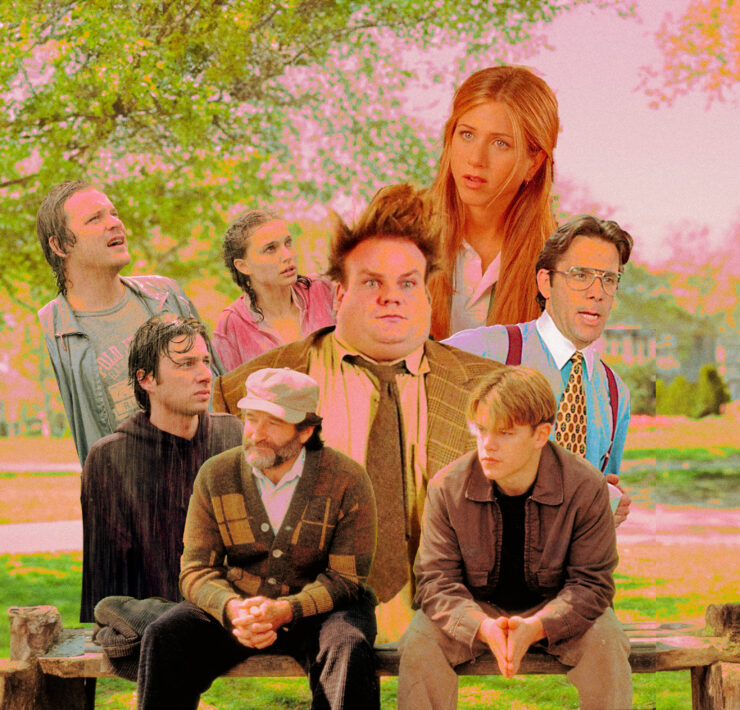
Stop me if you’ve seen this genre of viral post: a picture of some sort of isolated cabin, or maybe a seaside cottage, and some text offering a bargain. You can live in this place for a year with all your basic needs provided, but you have to give up all access to the internet. Pull this off, and you walk away a millionaire. Could you do it?
Yes! goes the exhausted shriek. Please! Anything to rescue me from this internet existence! But the real joke is on us, of course. We are all free to walk away from the internet at any time. Many of us know it’s having a negative effect on our lives and relationships. We know that the jolt of relief we get from our phones is nothing more than a short-lived dose of serotonin. We know it’s not real, but we stay anyway. Why? Maybe ignorance is bliss.
Over 20 years later, the full impact of The Matrix is difficult to quantify. Lana and Lily Wachowski’s deep dive into cyberpunk dystopia reads like an early stab at Black Mirror but the tech lingo is really just an excuse to get to existential questions of love, fate and identity. The movie landed in the internet’s early days, where speculation about its future was running rampant. That made it an ideal device for the Wachowskis’ real interests, which transcended the then-nascent era of big tech. The Terminator was a present-day warning about a future where our lives are ruled by robots. The Matrix is about a future ruled by robots that’s warning us about our lives in the present.
That warning was both just ambiguous and just specific enough to be retooled for an enormous variety of applications when the movie appeared in 1999. No matter who you were, Neo felt relatable both as an anonymous nobody in a lifeless job and as a kung-fu wizard of destiny. Morpheus (Laurence Fishbourne) and his offer of the red and blue pill was appropriated by everyone from Christian pastors as a metaphor for salvation to far-right message boards where “redpilled” denotes the acceptance of extremist ideologies. In 2020, Lily Wachowski, who is a trans woman, confirmed that the trilogy was written as a trans metaphor.
For better or worse, the reason The Matrix‘s impact was felt so broadly is that the Wachowskis had their fingers on the pulse. It’s hard not to nod along when Morpheus tells Neo that “You’ve felt it your entire life — that there’s something wrong with the world. You don’t know what it is, but it’s there, like a splinter in your mind, driving you mad.” He is literally looking into the camera when he says the Matrix is “all around us, even now, in this very room” and that, moreover, we are “slaves” to this Matrix. For viewers, it feels like someone is finally giving language to a deeply felt societal curse — a discontent both bone-deep and universal.
The first Matrix offered an attractive solution to all this: reject societal expectations and embrace your true calling as “The One.” By accepting his fate, Neo is able to defeat Agent Smith and rescue the crew of the Nebuchadnezzar. The reputation of the sequels is a little less sterling than the original, but they subvert the first one in intelligent ways. In Matrix Reloaded, we learn that Neo is not “the One” — he is one of many. His fate remains in his hands. In Matrix Revolutions, we see that rejecting society isn’t the same thing as rejecting community, and being a maverick is no substitute for living a life of sacrifice for others. It’s very possible that some of The Matrix‘s more toxic legacies in certain internet spaces might not have taken root if the whole trilogy had been canonized to the degree that the first entry has.
But The Matrix was right. In the 20 years since its release, that “splinter in your mind” has only burrowed further into the collective consciousness. Some people bury it. Some people turn to extremes to vet it. Many of us try to soothe it with surface-level treatments: consumer goods, professional status or political gamesmanship — but all of this is like treating a heart murmur with leeches.
The truth is, many of us know the deeper truth. We are, in many ways, like the rich younger ruler who came to Jesus, asking what we must do to be saved. Jesus ran through a litany of commands, and the young man nodded along. He did all that. He knew something was still off. He just didn’t know what.
“One thing you lack,” Jesus told him in Mark 10:21. “Go and sell all you possess and give to the poor, and you will have treasure in heaven; and come, follow me.”
As you probably know, the man couldn’t do it. Just like us, wanting so badly to unplug from it all but unable to muster the will to do it.
Taking the red pill has become such a toxic phrase on the internet that there’s reason to invoke it here, but you see where this is going: The Matrix was right because The Matrix understands the discontent lying at the heart of us all. Do you have what it takes to follow Alice down the rabbit hole? Do you think that’s air you’re breathing?






















